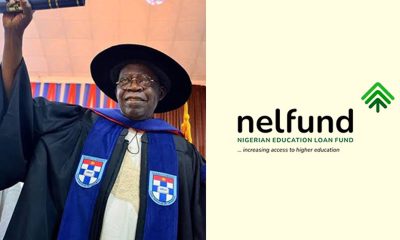Education
Lecturers worry as Nigerian students turn to AI for tests’ answers

Lecturers worry as Nigerian students turn to AI for tests’ answers
As many have applauded the introduction of Artificial Intelligence (AI) in revolutionizing education and making learning more accessible, there are also growing concerns about its impact.
While students hail AI tools like ChatGPT for enhancing their learning experience, lecturers are getting worried about the growing dependence on AI, which they argue fosters laziness and undermines academic integrity, especially with many students unable to defend their assignments or given tasks.
Prof. Isaac Nwaogwugwu, a lecturer at the University of Lagos, in an interview with Nairametrics, expressed frustration over the growing reliance on AI-generated responses among students recounting a recent experience he had.
“I gave an assignment to my MBA students, and out of over 100 students, about 40% submitted the exact same answers. These students did not even know each other, but they all used the same AI tool to generate their responses,” he said.
He noted that this trend is prevalent among both undergraduate and postgraduate students but is especially concerning in part-time and distance learning programs.
“AI is a serious challenge when it comes to assignments. Many students no longer think critically—they just go online, generate answers, and submit,” he added.
Surprisingly, some lecturers are also accused of over-relying on AI, setting a cycle where both educators and students turn to AI for convenience rather than intellectual rigor.
This debate raises critical questions about the role of AI in academic integrity and student development.
READ ALSO:
- Obasa: Lagos GAC holds crucial meeting to resolve assembly crisis
- PDP crisis: Anyanwu asks DSS, police to enforce Appeal Court order
- US-based Nigerian doctor commits suicide over court order
According to a UNESCO report, while ChatGPT reached 100 million monthly active users in January 2023, only one country had released regulations on generative AI as of July 2023.
As of December 2024, ChatGPT had over 300 million people using the AI chatbot each week and 1 billion messages sent every day around the world.
University lecturers are increasingly concerned about students submitting AI-generated assignments without truly understanding the content.
Dr. Felix Echekoba, a lecturer at Nnamdi Azikiwe University, expressed his concerns to Nairametrics about students increasingly relying on ChatGPT, only to struggle with answering basic questions when tested.
“Many students copy from ChatGPT and submit polished assignments, but when asked basic questions, they go blank. It’s disappointing because education is about learning, not just passing courses,” he said.
Prof. Nwaogwugwu noted the increasing number of first-class graduates could not be entirely attributed to AI but admitted that even high-performing students use these tools.
“A first-class student is a first-class student, AI or not, but that doesn’t mean they don’t cheat. The benefits of AI may be peripheral, but it is making students dependent and less analytical,” he said.
Another lecturer, Dr. Ereke, from Ebonyi State University, raised a different concern that some lecturers themselves are guilty of the same practice.
“It’s not just students using AI lazily. Some lecturers, out of their own laziness, generate lesson notes, course outlines, marking schemes, and even exam questions with AI without reviewing them. Students in turn use AI to generate answers. It’s a cycle of laziness and it is killing real learning,” he lamented.
Students, on the other hand, say AI has improved their learning experience by making academic materials more understandable and accessible.
Concerns over AI in Learning
Dorcas Akintade, a cybersecurity transformation expert, addressed growing concerns regarding the use of artificial intelligence (AI) tools such as ChatGPT and their potential risks to the educational system.
- She acknowledged the benefits of AI, however, emphasized the need for caution in its usage.
- Akintade highlighted the increasing hesitance among educators and schools toward incorporating AI tools in learning environments. She identified two primary reasons why AI tools are discouraged in educational settings: security risks and plagiarism. She explained that AI tools like ChatGPT are trained to respond based on user interactions, which may not align with the expectations of educators.
“It is not looking at it as a tutor,” Akintade said, explaining that AI doesn’t cater to specific teaching methods.
READ ALSO:
- Zulum gifts family of army officer killed by Boko Haram N30m to buy house
- Trump crackdown: Illegal immigrants deported from US in handcuffs
- Ignorance behind opposition to Sharia panels in South-West – Ex-Minister
Plagiarism is another issue, as AI pulls from existing data, often without proper attribution
“A lot of people need to understand, like I said, this is data that has been trained on. It is not just bringing things out from the sky. It’s bringing information that some other people are fed into it, which in essence means that is another person’s paperwork,” she said.
Lecturers worry as Nigerian students turn to AI for tests’ answers
Education
JAMB officials seize candidates’ hijab at Caleb varsity, Muslim students kick

JAMB officials seize candidates’ hijab at Caleb varsity, Muslim students kick
Muslim students have vowed to take legal action against any harassment, threats, or unjust treatment directed at female candidates wearing hijabs at centres for the ongoing Unified Tertiary Matriculation Examination (UTME).
This comes in the wake of reports of hijab harassment and hijab seizures that have sparked widespread concern among Muslim students and religious organizations, following incidents that took place on Thursday.
Under the umbrella of the Muslim Students’ Society of Nigeria, Lagos State Area Unit (MSSNLagos), the students issued a statement on Friday, signed by their Amir (President), Kamoldeen Abiona, expressing deep dissatisfaction with reports of harassment at several UTME centres across Lagos, particularly Caleb University in Ikorodu, a Christian-owned institution, where hijabs were forcibly removed from candidates.
Abiona criticized the ongoing incidents, emphasizing that despite established guidelines allowing the wearing of hijabs, female Muslim candidates continue to face harassment and coercion at examination centres.
“It is distressing to report that incidents of discrimination against female candidates wearing hijabs during the UTME persist,” said Abiona.
“Despite clear guidelines that allow hijabs, some female candidates are still subjected to undue harassment. These ongoing actions are a blatant violation of their rights and religious freedoms.”
He highlighted a particularly troubling incident that occurred on Thursday, April 24, at Caleb University in Ikorodu, where female Muslim candidates were forced to remove their hijabs to continue with their exams.
“This flagrant violation not only disrespects their religious beliefs but also goes against legal protections for religious freedom and equality.”
READ ALSO:
- Pep Guardiola, wife to ‘give marriage a second chance’ after Barcelona reconciliation meeting
- Groom cancels wedding, marries another lady same date, venue
- LP: Abure, Oti flex muscle as INEC studies Supreme Court judgment
Abiona called on the Joint Admissions and Matriculation Board (JAMB) to take immediate action against the erring UTME centres, urging the board to demonstrate that it does not support the harassment of hijab-wearing candidates.
He demanded justice for the affected candidates, insisting they be given the chance to retake their exams without religious interference. “JAMB must act swiftly,” Abiona stated.
“We call for a thorough investigation into these allegations and for appropriate sanctions to be imposed on any institution found guilty. The safety and dignity of all candidates must be safeguarded at all examination centres in Nigeria.”
“Moreover, we demand justice for the affected candidates, ensuring they have the opportunity to retake their exams without any obstacles, ensuring fairness and equity in the educational system,” he added.
The Muslim Students’ Society of Nigeria (MSSN), Lagos State Area Unit, reiterated its unwavering commitment to opposing discrimination and upholding the rights and dignity of students. The group called for an atmosphere of peaceful coexistence and respect for diversity within educational environments.
The students also issued a stern warning that any institution found in violation would face legal action.
“We will not hesitate to pursue legal proceedings against JAMB or any centre found harassing female Muslim candidates for wearing the hijab. This must end immediately, as wearing the hijab is both a legal right and a religious obligation.”
JAMB officials seize candidates’ hijab at Caleb Varsity, Muslim students kick
muslimnews
Education
FG announces 2025/2026 overseas scholarship for graduates (See how to apply)

FG announces 2025/2026 overseas scholarship for graduates (See how to apply)
The Federal Government, through the Petroleum Technology Development Fund (PTDF), has opened applications for the 2025/2026 edition of its Overseas Postgraduate Scholarship Scheme (OSS), targeting academically qualified Nigerian youths.
In an announcement shared via PTDF’s official handle on X (formerly Twitter), the agency revealed that the revamped scholarship programme is geared toward developing local expertise for the nation’s oil and gas sector.
“The Petroleum Technology Development Fund (PTDF) is pleased to bring to the notice of the public that the applications for the 2025/2026 Overseas Postgraduate Scholarship Scheme (OSS) has commenced,” the statement reads.
Eligible candidates can apply for fully funded master’s or doctoral studies in several international locations, including the United Kingdom, Germany, France, and Malaysia, as well as at the PTDF College of Petroleum and Energy Studies in Kaduna.
According to the agency,“Fully funded MSc scholarship will be provided in the United Kingdom, Germany, France, and Malaysia.”“Fully funded PhD scholarship will be provided in Germany, France & Malaysia.”
READ ALSO:
- Man beats brother’s wife to death in Jigawa
- Niger Gov Bago makes U-turn on dreadlocks ban after backlash
- P-Square: Jude Okoye freed after two months detention
For PhD candidates interested in studying in the UK, the award will now follow a split-site format, combining overseas learning with a local academic base.“Fully funded PhD scholarship for the United Kingdom will now be offered exclusively as a Split-Site Programme at the PTDF College of Petroleum & Energy Studies, Kaduna (CPESK) in collaboration with three partner Universities in the United Kingdom: Robert Gordon University, University of Strathclyde and University of Portsmouth,” the statement further explained.
The scholarship package covers return air travel, health insurance, tuition and bench fees (where applicable), and a living allowance for the duration of the programme.
Applicants must be Nigerian graduates with strong academic credentials in disciplines relevant to the oil and gas industry.
Interested individuals are expected to complete their applications via the PTDF Scholarship Management Portal. The deadline for submission is June 4, 2025.
Additional information on eligibility, programme specifics, and partner institutions is available on the official PTDF website.
FG announces 2025/2026 overseas scholarship for graduates (See how to apply)
Education
FG says colleges of education will begin awarding degrees in September

FG says colleges of education will begin awarding degrees in September
Minister of Education, Tunji Alausa, says a dual mandate allowing colleges of education (COEs) to award both bachelor’s degrees and the National Certificate in Education (NCE) is for implementation this September.
In 2023, the mandate was signed into law, having undergone ideation with numerous committees recommending its adoption.
It was to take effect from the 2024/2025 academic session (starting September 2024), where only federal COEs aged at least 10 years were to pilot the programme.
Alausa spoke in Abuja during a follow-up meeting on resolutions from the last biannual stakeholders meeting.
He said the implementation of the dual mandate will now begin in September 2025.
The education minister said it would boost enrolment in COEs and eliminate the need to convert COEs to universities.
Alausa said reforms within COEs are important for adapting to modern demands and technological advancements.
He urged educators to integrate technology, critical thinking, and computational skills into their curricula.
“We once had a strong educational system, and that’s what we are working hard to restore. All hands are on deck to achieve this,” he said.
“We must tackle the high number of out-of-school children and reduce learning poverty across the country. As teachers, you are at the centre of driving this change, and you must also challenge yourselves.
“The way we taught 30 or 50 years ago is no longer relevant. Education and teaching methods are evolving. You must start thinking about how to use technology in the classroom.”
Alausa stressed the need for educators to harness educational technology and artificial intelligence to improve teaching and learning outcomes.
Addressing declining enrolment in colleges of education, he urged administrators and staff to support the ongoing reforms, warning that the survival of their institutions depends on their ability to adapt.
“With this dual mandate, there is no need for conversion to university status. You should be the ones pushing for implementation, not the other way around. It’s a matter of your survival,” he said.
“The government has secured the future of colleges of education. It is now up to you to sustain them. Failure to embrace this mandate could lead to extinction.
“With this reform, there’s no justification for any college of education to seek university status.”
-

 metro20 hours ago
metro20 hours agoOmokri : How Tinubu’s political mastery started with Abiola, says El-Rufai, Obi’s forces can’t stop him
-

 metro3 days ago
metro3 days agoI’m not in supremacy battle with Ooni, says new Alaafin
-

 Education13 hours ago
Education13 hours agoJAMB officials seize candidates’ hijab at Caleb varsity, Muslim students kick
-

 Entertainment2 days ago
Entertainment2 days agoP-Square: Jude Okoye freed after two months detention
-

 International13 hours ago
International13 hours agoUS releases 41 countries granted 90-day entry without visas (full list)
-

 Politics2 days ago
Politics2 days agoLabour Party collapses into APC in Plateau
-

 Business3 days ago
Business3 days agoNigeria’s gas production increases by 15.6% to 227,931.65 mscf
-

 metro2 days ago
metro2 days agoNiger Gov Bago makes U-turn on dreadlocks ban after backlash











